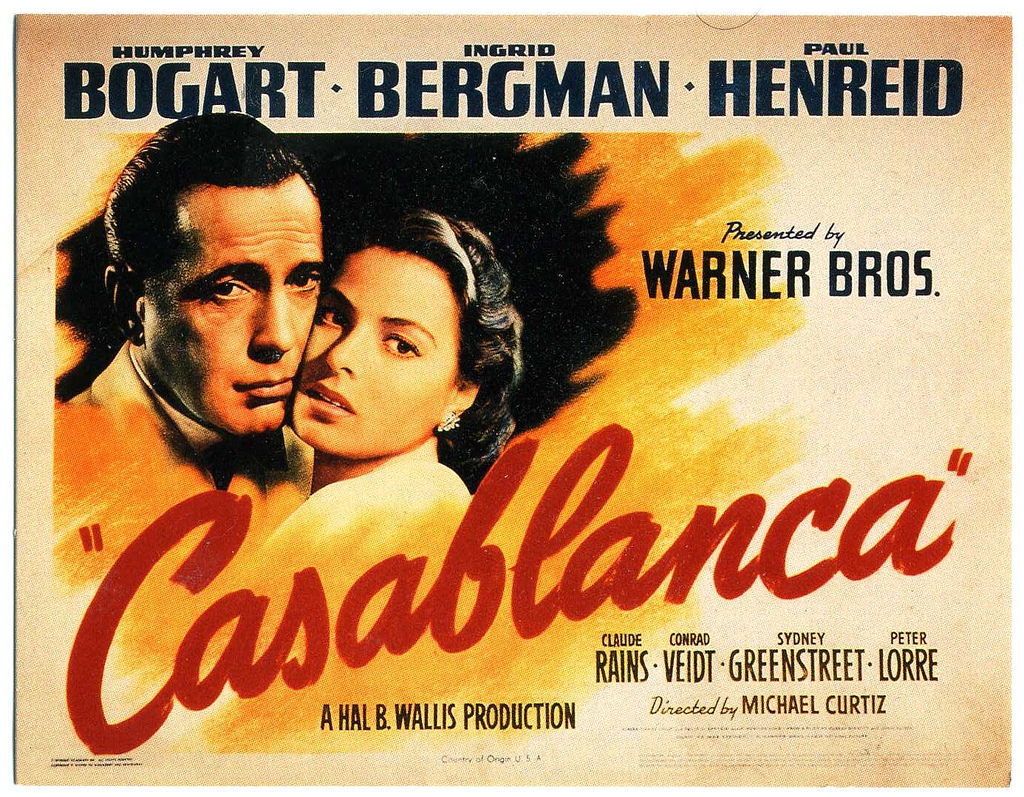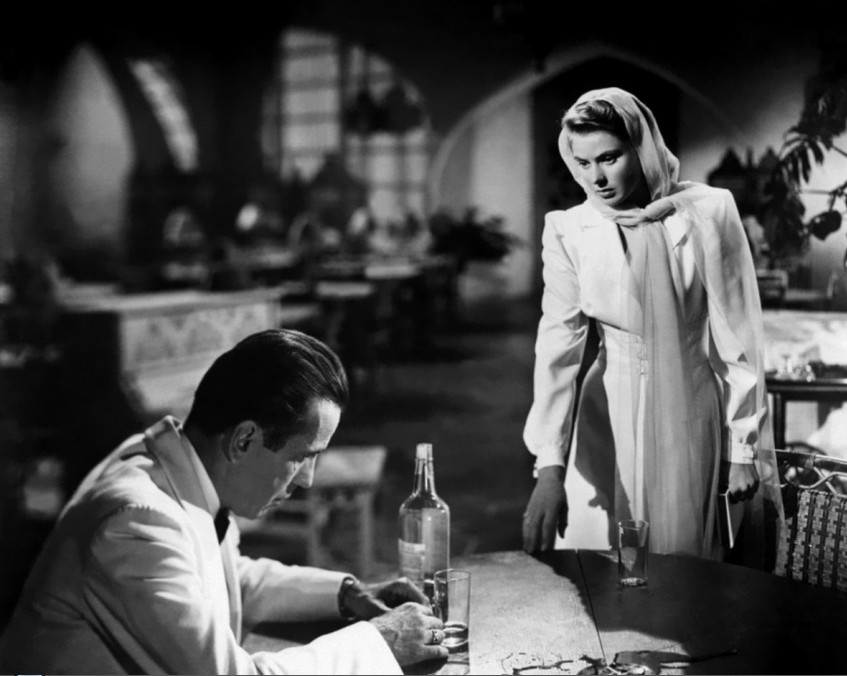
Hey, who says Hollywood’s wrong by not giving a shit about writing these days? Is it REALLY that bad to go into productions with unfinished scripts? They can all point to the fact that one of the greatest movies of all time, Casablanca, went into production only half-finished! You heard that right. Casablanca didn’t have a finished script when they started filming! But here’s what’s always bothered me about this often brought up piece of cinema history. There’s a difference between “writing the script during production” and “writing an already well thought-through tightly outlined script during production.” If all your scenes are in place. If you already know how your characters are going to evolve and change. If you already know where your story is going. And in some cases, you already have the scenes thought out. That kind of “writing during production” actually still has a chance of being good. But if you’re literally making up the entire plot as you go along, that’s a different kind of “writing during production.” As much as I love Gareth Edwards as a director (the guy is going to be a freaking All-Star), you can get a sense of what REALLY going into a production without a script results in by watching his first film, “Monsters.” You’ll spot a lot of repetition, a hazy through-line, and a lack of character development, all things that need to be ironed out ahead of time. My point being, don’t think that because Hollywood lore states that Casablanca’s script was unfinished when filming began, that the underpinnings weren’t in place. It was probably mostly there. There are lots of cool other things we could discuss about Casablanca if we had more time. There were four writers revolving in and out as the script was written. A few of them had different takes on the story, making it even more miraculous that the story came together. For example, there was a lot of internal discussion over whether they should ditch the flashbacks (I personally think they could’ve). To think that they were debating the flashback device all the way back in the 1940s! That argument will never go away! Anyway, since Casablanca is well known for its dialogue, I’ll try to focus a lot of today’s tips on dialogue. But there are some other lessons we can learn here as well. Let’s take a look.
1) Combine scenes whenever possible – This is an old tip, but a good tip. Our protagonist, Rick, digs some money out of his safe for Emil, his casino runner, WHILE discussing with Casablanca’s head policeman, Renault, his planned arrest of Victor Laszlo. An amateur writer would’ve addressed each of these situations separately, taking up valuable screenwriting real estate. Pro writers combine scenes so the story moves along faster!
2) Use a clever exchange/sparring to hide backstory and/or exposition – After Head Policeman Renault tells Rick that they’re going to arrest Victor Laszlo, the writer needs to get in some backstory that Laszlo escaped from a concentration camp, as his time at the camp is an integral plot point. Now a bad writer would’ve had Rick bring this up immediately in his response, resulting in an “obvious backstory” line like, “But he escaped from a concentration camp. He’ll probably escape you.” Instead, the writer diverts attention from the line by creating a playful sparring, allowing him to hide the backstory within the exchange organically: “It’ll be interesting to see how he manages,” Rick says. “Manages what?” Renault asks. “His escape.” “Oh, but I just told you.—“ “—Stop it.” Rick replies. “He escaped from a concentration camp and the Nazis have been chasing him all over Europe.” The sparring here makes the backstory line invisible.
3) For good dialogue, make sure each character has a set of clearly defined opinions about the world/life – The more you know about your characters, the more likely they’ll deliver good lines of dialogue. Let me give you an example. Early in the script, Renault tells Rick’s head waiter, Carl, to give our villain, the Nazi Major Strasser, “a good table, one close to the ladies.” Now say the writer knows nothing about his waiter, Carl, here. Most bad writers wouldn’t. They’d say, ehh, he’s a minor character. I don’t need to know anything about him. In that case, you’re likely to get a weak generic line, something like, “You got it, boss.” But had you given some thought to Carl, you may have decided he harbors a deep resentment towards Nazis, and likes to get in subtle digs at them whenever possible. Now as you approach his response, you have a lot more to play with. It is for this reason that we get the line in the script, which is a thousand times better: “I have already given him the best, knowing he is German and would take it anyway.”
4) When placing a bunch of characters together, make sure that every single character has an angle – This is what’s so great about Casablanca. There isn’t one person in this bar who doesn’t have an angle, who isn’t looking to push their own agenda. Ugarte wants to sell those Visas. Renault wants to impress Strasser. Strasser wants to take down Laszlo. Laszlo wants to escape to America. Rick wants to avoid Ilsa. Ilsa wants to talk to Rick. And to take it one step further, make sure a lot of those angles clash. That’s where you get conflict, which is where you find drama, which is how you entertain audiences. That’s basically Casablanca in a nutshell.
5) Whatever your character’s flaw is, make sure you write a scene that shows that flaw as a choice – Here, Rick’s flaw is that he only cares about himself. He doesn’t stick his neck out for anybody. Therefore, a scene is written where he can either save Ugarte (the man who gave him the visas) or let him be arrested. Ugarte pleads for help from Rick, but Rick just stands by as he gets arrested. Through that choice, we learn his flaw.
6) Stating one’s flaw out loud is no longer in vogue – It’s one of the most famous lines in cinema: “I stick my neck out for nobody.” And yet if you used it today, it would feel way too on-the-nose. Go with an action, as explained in the previous tip, instead. Action (show, don’t tell) always has more of an impact than words.
7) Be “disagreeable” in your dialogue as much as you can – A cute and simple way to spice up dialogue is to never have characters agree with what is said. Have them add resistance or conflict or obstacles or opposing reactions. So when the German, Strasser, says to Rick, “Do you mind if I ask you a few questions? Unofficially, of course.” Rick doesn’t respond in the positive with, “Sure.” He turns it around and says, “Make it official, if you like.” If characters are just agreeing with each other all the time and having really easy conversations, there’s a 99% chance that those conversations are boring as hell.
8) Never underestimate the power of sarcasm during dialogue. It almost always makes the dialogue more fun – When Strasser asks Rick, “What is your nationality?” Rick doesn’t respond with the boring, “I’m a bar owner, in case you hadn’t noticed.” He replies. “I’m a drunkard.”
9) Add extra people to your dialogue scenes – There’s rarely a scene in Casablanca with just two people. I don’t think it’s any coincidence, then, that the movie is known for its great dialogue. Extra characters act as agitators and obstacles to dialogue, which forces characters to be more creative in the ways they talk with one another. Woody Allen, another great dialogue writer, uses this approach a lot as well.
10) Make the “other man” tough to leave, as opposed to easy – Remember that drama usually thrives on tough choices. If you make the choice for any character too easy, it’s obvious what will happen, which is boring. Make it difficult, and the audience will be hooked, as they’ll be unsure what choice the character will make. Here, the “other man” (Laszlo) is about as good a man as they come, so we really have no idea who Ilsa is going to choose, him or Rick.
11) Unless the boyfriend/husband is also the villain – There are certain situations/stories where the “other man” is also the villain. He’s beating our heroine or is the “wrong guy” for her. In those cases, it’s okay for him to be bad. But if the other man isn’t the villain in the story (here, the Nazi, Strasser, is our villain), consider making him a “good guy,” as that’ll make our heroine’s choice tougher, and therefore more dramatically compelling.
 These are 11 tips from the movie “Casablanca.” To get 500 more tips from movies as varied as “Aliens,” “Pulp Fiction,” and “The Hangover,” check out my book, Scriptshadow Secrets, on Amazon!
These are 11 tips from the movie “Casablanca.” To get 500 more tips from movies as varied as “Aliens,” “Pulp Fiction,” and “The Hangover,” check out my book, Scriptshadow Secrets, on Amazon!


